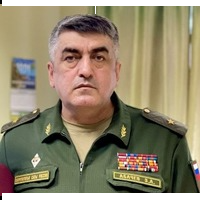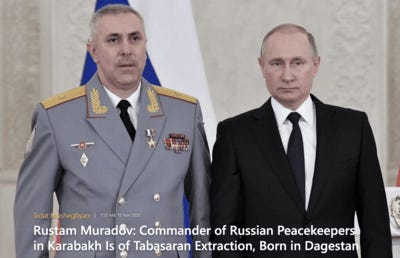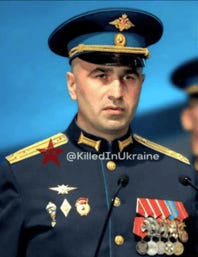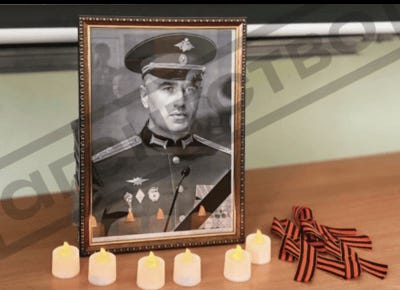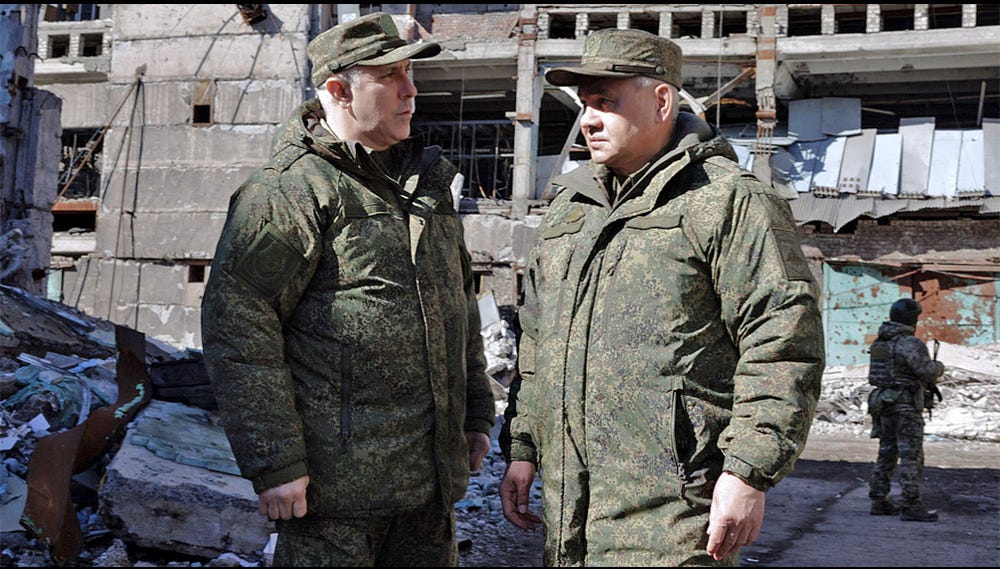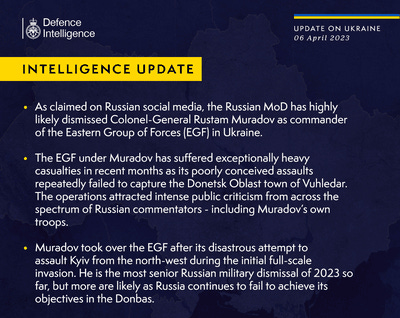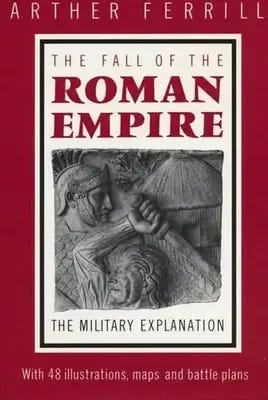From Dagestan to Donbas: The Rise of Putin’s Tabasaran Generals
by Mairbek Vatchagaev and Glen E. Howard
Lieutenant General Esedulla Abachev
On August 17, Ukrainian forces severely wounded the Deputy Commander of the Russian Sever North Group of Forces, Russian Lieutenant General Esedulla Abachev in an attack inside Russia’s Kursk province. The strike occurred on the Rylsk–Khomutovka highway, causing the Russian General to lose an arm and a leg as a result of the attack, marking yet another battlefield setback for Moscow. To date, Russia has lost ten Russian Generals and over 5,000 officers in the war since Moscow invaded Ukraine in August 2022.
Beyond the headlines of the attack, what was little noticed is that General Abachev represents a small, obscure Muslim minority in southern Dagestan, in the North Caucasus, known as the Tabasarans (who are closely related to the ethnic Lezgins), whose total population is only 147,000.
Abachev’s rise through the ranks of the Russian army reflects a growing trend whereby non-ethnic Russians are rising to senior Russian military leadership positions from the Muslim minorities of the North Caucasus, as well as the Middle Volga region. This trend is becoming increasingly more commonplace among Russian officers as combat losses continue to mount for Moscow after three years of heavy military losses in Ukraine, estimated to be 1,114,380.
One of the key questions to arise from this emerging phenomenon is whether this is a new trend or the wave of the future for the Russian military, and if so, what does it portend in terms of Russian military effectiveness and its ongoing combat operations as more and more non-ethnic Russians from its ethnic minorities rise to senior command positions in the Russian military, and in some cases are performing quite poorly when given senior command positions (see below).
Who are the Tabasarans?
Ethnic minorities serving in senior leadership positions under the command of the Russian Tsar are nothing new to the Russian military. The famous Tsarist General Ivan Bagration, for example, a native of Georgia rose to a senior leadership position and emerged as a brilliant military commander during the Napoleonic Wars. However, the rise of the Tabasarans appears to be an entirely new phenomenon in the post-Soviet Russian military, particularly when they originate from such a small Muslim minority in the North Caucasus.
To date, four Tabasarans have been awarded the Hero of Russia title for their role in the Ukraine war: Rustam Muradov, Esedulla Abachev, Ruslan Kurbanov, and Israfil Magomedov (posthumously). By comparison, in total, only nine Dagestanis have received the title of Hero of Russia. (source for Dagestanis?). For a comprehensive list of combat casualties and losses among the North Caucasian peoples during the Ukraine war, please refer to the extremely detailed assessment report by Kavkaz-Uzel.eu on this issue.
The Tabasarans have a long history and are believed to have formed as a distinct people during the existence of Caucasian Albania (early first millennium). Following the decline of Caucasian Albania, they became part of the Arab Caliphate, which influenced their cultural development under Arab and Persian traditions. Until their incorporation into the Russian Empire in the second half of the 19th century, the Tabasarans fought for independence, resisting both Russia and Persia. Notable periods in Tabasaran history include the Tabasaran Maisumate (late 15th to mid-17th century) and the Tabasaran Qadiate (mid-17th to late 18th century), which functioned as independent political entities.
During the Soviet era, the Tabasarans were classified as an ethnic subgroup within the Dagestani Lezgin cluster of nationalities that make up the varied ethnic mosaic of approximately 30 ethnic groups and 81 different nationalities residing in the Republic of Dagestan, which makes the North Caucasus republic another veritable mini-Yugoslavia in terms of being a cauldron for future conflict. (For an in-depth comparison of the North Caucasus to the Western Balkans in terms of being a veritable powder keg of nationalities, see Janusz Bugajski’s book on this topic).
Hardly known among even Western experts on the North Caucasus, the Tabasarans have been recognized as a distinct people. Like other Dagestani groups, they maintained a strong tradition of military service in the Soviet and now Russian army.
Participation in the current war in Ukraine is often characterized among themselves as defending Russia, through Kremlin-backed financial incentives from the state also play a major role in their enlistment due to the immense poverty in rural Dagestan. According to one report as of September 2022, 34 men from the Tabasaran district had been confirmed killed in Ukraine, and according to one unverified report, more than 7,000 Tabasarans (roughly one in ten adult males) had been mobilized to fight in Putin’s Ukraine war since 2022. Dagestan alone has suffered extensively as a result of the war and sustained the highest number of combat fatalities among Russia’s regions, with 1,525 officially confirmed killed in Ukraine, and the unofficial number is likely considered to be several times higher in light of Russian censorship of actual combat losses.
Putin’s Tabasarans
General Abachev is considered one of a handful of non-ethnic Russian officers to achieve a senior field position in the Russian army during the Ukraine war. His career history indicates a journey through many of the notable military schools in the former Soviet army. In 1989, for example, shortly before the collapse of the Soviet Union, Abachev graduated from the Kharkov Guards Higher Tank Command School. During the course of his career, he has received numerous awards, most notably the Gold Star of the Hero of Russia for his actions during combat operations in Ukraine. He also holds the Order of Courage, the Order “For Military Merit,” the Medal of the Order “For Services to the Fatherland” (1st and 2nd class), as well as medals “For Courage,” “For Distinction in Military Service” (2nd class), and “For Combat Cooperation.”
In 2002, Abachev graduated from the Combined Arms Academy of the Russian Armed Forces and later served as head of logistics for the 78th Tank Brigade and as a regimental commander. From 2014 to 2017, he commanded the 19th Separate Motor Rifle Brigade of the 58th Combined Arms Army in Vladikavkaz. Between 2017 and 2021, he served as Chief of Staff and First Deputy Commander of the 5th Combined Arms Army of the Eastern Military District. Lastly, he also participated in the Karabakh conflict, the Second Chechen War, the 2008 war in South Ossetia, and the recent Russian military campaign in Syria. In March 2021, Abachev was promoted to the rank of Major General, and in July 2022, President Vladimir Putin awarded Abachev the title of Hero of Russia for his role in the occupation of the Luhansk region, and in February 2023, he was promoted to Lieutenant General. Ukrainian sources accuse him of involvement in war crimes against civilians in Lysychansk, Luhansk region. Recently, Abachev was named commander of the border protection group and deputy commander of the “Sever” forces, where he was injured in the recent August Ukrainian attack.
The rise of a non-ethnic Russian like Abachev has an important significance among the Muslim nationalities of the North Caucasus, and the Tabasaran general has even been hailed by Chechen leader Ramzan Kadyrov. Abachev’s rise to such a high level is quite remarkable, given that one time during the Soviet Union, it was extremely rare for a non-Russian to rise to a senior position in the Soviet military. The one notable exception to this rule was Djokhar Dudaev, the former President of Chechnya, who rose to the rank of Major General in the Russian Air Force and commanded a Soviet air base at Tartu before he joined the Chechen independence movement in the 1990s and successfully fought the Russians until he died in 1996.
Perhaps this is why Chechnya’s Kadyrov went so far as to announce on September 6, 2024, that a street in Grozny had been renamed in Abachev’s honor, shortly after the Ukrainian attack. Previously, the Tabasaran General had been decorated with the highest award of the Chechen Republic—the Akhmat Kadyrov Order—for joint operations with the “Akhmat” special forces during the capture of the Luhansk region.
General Abachev, however, is not the only Tabasaran to rise to such visibility in the Russian Army during Putin’s war in Ukraine. It appears that there has been a notable trail of promotions and awards for other Tabasarans who fought with distinction in the Russian army, while another prominent Tabasaran is Magomed Abdurizaev, who has been awarded three Orders of Courage and Lieutenant General Rustam Muradov who has commanded the Eastern Military District since October 2022 and led the Russian “Vostok” fighting group in Ukraine whose career will be examined in more detail below. Other prominent Tabasaran officers include retired Major General Ziyautdin Abdurakhmanov, who received his rank in 1989 and later became the head of the Astrakhan airport.
Col. Abdulaziz Shikhabidov, ex-commander 76th Air Assault Division
Yet another prominent Tabasaran who climbed the ranks in the Russian military during the Ukraine war is Colonel Abdulaziz Shikhabidov. On February 25, 2025, President Putin appointed Shikhabidov to be commander of the Pskov 76th Guards Air Assault Division of the Russian Airborne Forces, widely considered to be one of Russia’s most elite combat divisions. Two months after his appointment, however, Shikhabidov was killed in Ukraine on May 6, 2025, shortly after being appointed to his new position.
The Russian media appears to have gone to great lengths to laud the military accomplishments of its tiny Tabasaran Muslim minority to acknowledge their service to Russia. The Russian Agentstvo Telegram media outlet took the death of Shikhabidov to new levels, publishing a video of the funeral, and also depicted how schools in Dagestan were adorned with memorial corners displaying a description of Shikhabidov’s military biography. In Buynaksk Secondary Boarding School No. 3, extracurricular activities were held for students in grades 7-9: children decorated the classroom with St. George’s ribbons, held a minute of silence, lit candles of remembrance, and listened to a speech by the Minister of Education of the republic, Yakhya Buchayev.
The great irony about Shikhabidov is his service as head of the 76th Pskov was relatively short-lived. Shikhabidov was appointed commander of the 76th Division personally by Vladimir Putin less than two months before his death on March 10, 2025. A month later, Putin publicly praised the division, emphasizing its “daily successes” at the frontlines. After that, a large-scale campaign to honor the new commander began in Dagestan: billboards with his image appeared in the republic, and children were asked to draw his portraits in schools.
Before his appointment to the Pskov Division, Shikhabidov had a career path similar to other Tabasaran officers who climbed the ranks, having participated in the wars in South Ossetia as well as in Syria, where he received numerous medals. It is important to note that members of the 76th Guards Air Assault Division were stationed in Bucha, where, according to investigations, the soldiers were involved in violence against civilians and other war crimes.
The Rise and Fall of Rustam Muradov
One of the most intriguing senior Tabasaran military commanders who served in the Russian Armed Forces is Lieutenant General Rustam Muradov. His rise in the Russian military could be a major explanation as to why we have seen so many Tabasaran’s rise to such senior positions under Putin. Muradov’s career needs to be retraced in detail below because it points to a patronage network in the Russian armed forces that links back to the Russian Chief of the General Staff Valerii Gerasimov, who just turned 70 years old and is viewed as the principal Russian General overseeng the Russian military campaign in Ukraine.
Lt. General Muradov, has had a long and distinguished career in the Russian Armed Forces. Born in 1973 in the village of Chinar near Derbent, Muradov’s military career began with training at the Suvorov Military College in Kazan, later graduating from the prestigious Voroshilov Military Academy of the General Staff in 2015. He has fought in both Chechen wars, earning two Medals of Courage for his leadership in combat operations, including the capture of the headquarters of Chechen leader Aslan Maskhadov. He later commanded the 17th Motorized Rifle Brigade and held various leadership roles in the Russian Armed Forces.
His experience expanded beyond the Caucasus. In 2016, he served as Russia’s representative at the Joint Ceasefire Control Center in Donbas, and in 2017, was deployed as a military advisor in Syria, leading Russian forces in Deir ez-Zor. For his service, President Vladimir Putin awarded him the title Hero of Russia in December 2017. By 2019, he had risen to Deputy Commander of the Southern Military District, receiving promotion to Lieutenant General in 2020.
Muradov has played significant roles in multiple conflicts and international missions, having served as a commander of Russian peacekeepers in Nagorno-Karabakh following the 2020 Armenia-Azerbaijan war. From 2015 to 2017, Rustam Muradov served as the First Deputy Chief and Chief of Staff of the 41st Russian Combined Arms Army. In 2017, Muradov was appointed military adviser in Syria, where he was awarded the title of Hero of the Russian Federation. He later commanded the 2nd Guards Red Banner Army of the Central Military District until being replaced by Andrey Kolotovkin in 2018. Afterwards, he became Deputy Commander of the Southern Military District. Muradov has held several posts during the 2022 Russian invasion of Ukraine. On 7 October 2022, he was appointed Commander of the Eastern Military District, and on 18 February 2023, he was promoted to Lieutenant General.
Muradov on Service and Loyalty to the State Over Ethnos
In 2012, in response to a question from a reporter from the Russian military newspaper Krasnaya Zvezda concerning his vision for resolving the issues of consolidation in multinational teams. In other words, what Muradov was being asked ' ‘how does it feel to be a non-ethnic Muslim from the North Caucasus working in the service of Imperial Muscovy’. During that interview, General Rustam Muradov noted the following:
“I think that an officer, as a statesman, should not adhere to a notion of nationality. That is one of my principles. I am convinced that there are no North Caucasians. There are soldiers who were drafted from the North Caucasus. That is why it is necessary to treat everyone strictly according to the code.”
As a non-Russian from the North Caucasus, Muradov used this question to downplay his nationality by emphasizing his loyalty to the Russian state over his ethnic identity, insisting that soldiers must be judged by their loyalty and service [to Russia] rather than their own nationality—reflecting his vision of integration within Russia’s multinational armed forces despite his non-Russian background. According to Paul Goble, the Russian approach to ethnos is that “Putin wants people to identify as civil Russians (Rossiyane) and not as members of a nationality. So stressing loyalty to the state is a way of showing loyalty to Putin’s ideas. But it does not necessarily preclude continued loyalty to one’s ethnic community.”
The Disaster at Vuhledar
Despite these accomplishments, Muradov experienced a major fall from grace in the Russian military leadership after the failed offensive at Vuhledar in February 2023. Under his command, Russian forces experienced staggering losses. According to Oryx, Muradov’s forces lost 103 pieces of military equipment in just three days, while Ukrainian losses were minimal. Soldiers and pro-war bloggers condemned Muradov’s leadership, accusing him of recklessly sacrificing lives. Units such as the 55th and 40th Naval Infantry Brigades were nearly destroyed, with one marine recalling that only eight men remained in his company. Sources in the Russian military linked Muradov’s removal directly to these failures, calling him a “mad idiot” who sent troops to certain death. Muradov was dismissed from his post on March 26, 2023.
On April 6, 2023, the United Kingdom Ministry of Defense offered a unique profile of Muradov’s career in the Russian military and highlighted his poor military performance despite his receipt of the title Hero of Russia. The UK MOD described Muradov’s firing as the “most senior Russian military dismissal of 2023.” Moreover, under Muradov’s leadership, Russia’s Eastern Group of Forces (EGF) suffered exceptionally heavy casualties due to the repeated poorly planned Russian assaults, which failed to capture the town of Vuhledar, it noted.
Why do Putin’s Tabasarans Matter?
The rise and fall of General Abachev and the emergence of several senior-ranking Tabarasan Generals from such a small Muslim minority in southern Dagestan is an issue of great symbolic importance to the future of Russia. First and foremost is the fact that Russian combat losses in four years of fighting have noticeably thinned the ranks of the Russian military leadership, permitting more opportunities for non-ethnic Russians from regions like the North Caucasus to rise to more prominent senior positions in the Russian army, which is highly reminiscent of the later stages of the Roman Empire before its collapse.
Before the fall of the Western half of the Roman Empire, Barbarian Generals serving in the Roman Army, such as Flavius Stilicho, rose to senior positions due to the shift in the recruitment base for the Roman Army which led to the rise of Romanized Barbarian Generals, aptly described by historian Arther Ferrill in his classic work The Fall of the Roman Empire:The Military Explanation. Ferrill noted in his class work that until its later stages the Roman army “had a highly trained and disciplined army”, but increasingly the more Rome used barbarians and barbarian generals, the Roman army became more unreliable as it neared collapse.
Fast forward to the present, and the loss of so many highly trained officers in the Russian army has had a noticeable impact on the decline of Russian combat effectiveness, as it did with Imperial Rome. In the case of Abachev and Putin’s other Tabasaran generals, we are witnessing a similar development in the Russian army, whereby highly Russified North Caucasians are emerging in key military positions only to experience notable defeat like General Muradov at Vuhledar. Yet another factor accounting for the rise of the Tabarasans is the Russian military patronage networks.
Former Russian Minister of Defense Sergei Shoigu and Chief of the General Staff Valerii Gerasimov, for example, have played a role in these military promotions like Abachev and Muradov and it is safe to assume that many of these Tabasaran Generals built their careers over the past two decades by serving in the Chechen wars in the North Caucasus who were later deployed to Syria, which became a training ground for many Russian Generals, like the disgraced General Surovikin.
It is visibly apparent that the Ukraine war has severely thinned the ranks of Russia’s military leadership and that more and more non-ethnic Russians will emerge in senior positions. Moscow, like Rome before it, has shifted its recruitment base to replace its military losses, leading to the rise of non-Russian Generals like Abachev, whose competency was clearly lacking. As Russian manpower losses show no signs of recovery then Western military observers are likely to see the emergence of more and more representatives of Russian ethnic minorities climbing the ranks of senior Russian military positions. It is one of several key factors accounting for the ongoing decline in combat efficiency of the Russian army, as loyalty and patronage matter more than combat skills.
Such a development has ominous consequences for the state of the Russian army in Putin’s Russia and for the future of its military operations in Ukraine. The rise of Putin’s Tabasaran generals may also be a portent of Russia’s future, as he could one day turn to these senior-ranking non-Russian officers to suppress internal unrest as the war grows more unpopular at home—yet another pattern hauntingly reminiscent of the waning days of Imperial Rome.
Thank you for your support! Please remember that The Saratoga Foundation is a non-profit 501(c)(3) organization. Your donations are fully tax-deductible. If you seek to support The Saratoga Foundation, you can donate by clicking on the PayPal link below! Alternatively, you can also choose to subscribe to our website to support our work.
https://www.paypal.com/donate/?hosted_button_id=XFCZDX6YVTVKA
Thanks for reading! This post is public, so feel free to share it.

